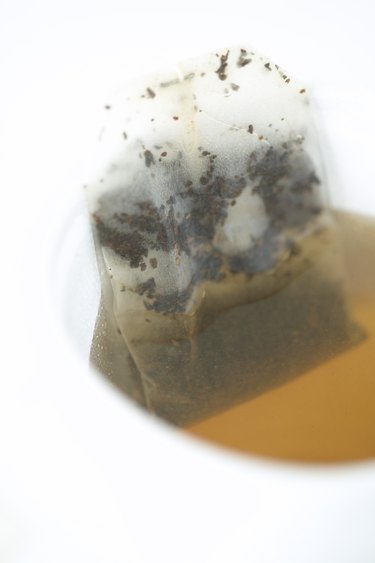
If you are an expectant mother, you likely have considered what foods and beverages you need to avoid during pregnancy. Though tea contains less caffeine than coffee, many pregnant women avoid it. Oolong tea is a type of tea that comes from the same plant as black tea and green tea. Like other varieties, oolong has beneficial compounds and varying amounts of caffeine.
Oolong Tea
Video of the Day
Oolong tea is derived from the camellia sinensis plant, the source of all true teas. Different types of tea from this plant range in flavor, color, intensity and caffeine content depending on how they are dried or prepared. Oolong is between black tea and green tea in its fermentation process, varying between 10 to 70 percent oxidation, according to Oolong.org. This semi-fermented variety contains several beneficial compounds including polyphenols, according to the site TeaBenefits.com. These antioxidant compounds help to remove free radicals in the body and reduce unhealthy cholesterol levels.
Video of the Day
Caffeine During Pregnancy
The good news is that you do not have to give it up caffeine completely while you are pregnant. The pregnancy and infant health site BabyCentre advises cutting down on excess caffeine so that you do not consume fore than 200 milligrams -- about two mugs of tea a day. Though tea contains less caffeine than coffee, its caffeine content depends on how long it is brewed. Steeping the tea for longer periods for a darker color and more intense flavor will also increase the amount of caffeine it contains. Hence, brewing a light tea and drinking oolong or green tea instead of black tea is better during pregnancy.
Caffeine Effects
Too much caffeine can cause low birth weight and even a higher risk of miscarriage, according to BabyCentre. Additionally, just as caffeine is a stimulant for you, it can make your baby hyperactive or restless in the womb. This occurs because caffeine increases your heart rate and metabolism to make you feel more alert; your baby will react to this stimulant compound in a similar way.
Oolong Caffeine Content
BabyCentre lists sources of caffeine, which includes coffee, tea, sodas, energy drinks and supplements and chocolate. All tea, including green tea, contains caffeine. The Mayo Clinic notes that black tea contains about 60 milligrams of caffeine in a small eight-ounce cup. The caffeine content in oolong tea ranges slightly lower than than this. Even decaffeinated tea contains small amounts of caffeine and should not be consumed in large amounts if you are pregnant.